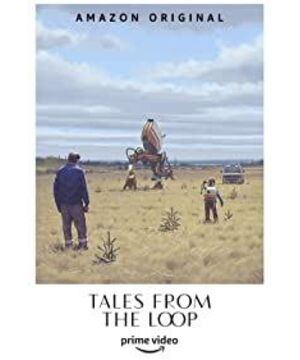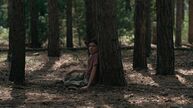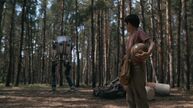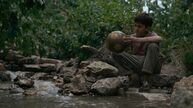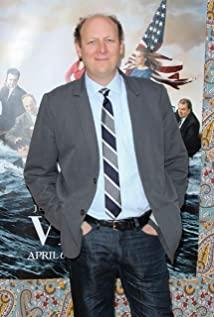Seriously, this show shattered my old imagination of sci-fi dramas.
Just click on an episode, and what catches your eye is the endless snow and the pure white sky.
Almost every frame is filled with the "frigid" style unique to the Nordics, with cold tones paired with minimalist compositions.
All in all, just two words: high and cold .
Such a visual style is actually derived from the picture book of the same name by the Swedish artist Simon Stallenhager .
He is very good at telling stories with brightly colored, contrasting images and concise language.
In addition, his creations are also full of various "conceptualization" products——
Mysterious mechanical creatures, dilapidated buildings standing above the wasteland, giant silent objects everywhere.
In addition to being convinced by his brain hole, he also captures a vague sense of oppression in this wasteland scene from time to time.
Probably, this is the charm of Simon Starlenhager.
Then let's talk about the story.
The narrative rhythm of the show is relatively slow and hot, which is in sharp contrast to the "cold" visual style.
There are almost no eye-catching bursts and reversals in the play, and some are just getting better and better atmosphere and concise and lively lines.
I guess the impatient audience may not be able to survive the first 20 minutes, so they are eager to turn on the "double speed mode" and speed up the show.
But I must say, if you are willing to settle down, it will never let you down.
The story begins with the little girl Loretta .
She and her mother, Alma , were ordinary residents of a small town in Ohio, and they used to live a peaceful life.
Until one day, Alma stole a piece of etched stone from an experimental center called "The loop" and conducted experiments without permission.
This secret experiment changed the fate of the mother and daughter.
When she wakes up, Loretta finds that the whole house has vanished out of thin air, not even her mother, as if her past life was all just a dream.
All she could find was the black etched stone that fell to the ground.
Just when Loretta was most helpless, she met the little boy Cole , who promised to accompany her to find Alma.
On the way the two walked together, more strange things happened one after another——
The experimental center where my mother worked said that there was no employee named Alma;
Loretta's wooden house is disintegrating as if it is not controlled by gravity, while slowly flying into the air;
There was a strange robot standing on the snow, as if monitoring the movements of the two.
The sudden disappearance of the mother, the etched stone with mysterious power, and the confused little girl, these three important clues strung the beginning of the story.
If you follow the usual routine of American TV dramas, then the protagonist should expose a long-planned conspiracy, or prepare to start the route of "saving/changing the world".
But "Ring Story" did not play cards according to the routine, but introduced the story in another direction.
Desperate, Loretta didn't know where to go, so she had to go back to Cole's house again. Inadvertently, she walked into Cole's mother's study.
Out of curiosity, she opened the tool box on the desk and found a yellowed test paper inside.
She was surprised to find that the handwriting on the test paper was exactly the same as her own, and upon closer inspection, her name was still written on it.
Everything in the camera turned to Cole's mother.
After listening to Loretta's experience, she instantly understood everything in front of her, and then blurted out: "That girl, she is me."
That's right, this is exactly a " loop "-themed story.
Under the influence of the etched stone, Loretta, who wanted to find her mother, broke the barrier of time and space and met her future self.
But the focus of the story lies not only in the cycle of the timeline, but also in the cycle of the fate of the characters——
Loretta once swore when she mentioned her mother's disappearance, "I will never treat my children like this in the future." However, she still failed to stop the "tragedy of maternal love" that has been repeated in three generations.
Growing up hard in the absence of maternal love, she eventually became a "reissue" of Alma: a grumpy, research-obsessed, neglectful mother. As the saying goes, "When you grow up, you become the person you hate the most."
Alma, who is addicted to scientific research, always ignores her daughter's feelings, so Loretta prefers to play outside and does not want to go home after school. The adult version of Loretta also devoted herself to research in order to find out the truth. As a result, Cole often ventured alone in the forest.
Both of them had such lonely and lonely childhoods, so they felt pity for each other after meeting each other.
The question is, can Loretta break the cycle when she grows up?
Fortunately, the answer is yes.
"It's hard to say, but I think Alma probably doesn't want to be a mom."
"That's what Cole told you too."
It was in the dialogue between the two that she finally realized the problem. She was always immersed in the sadness and confusion of losing her mother, and gradually forgot that Cole also needed her care.
Taking this encounter across time and space as an opportunity, Loretta reached a reconciliation with herself, and also found the touch of family affection. She started spending more time with her son, trying to make up for the mistakes she had made.
Although a little sad, the ending is heartwarming.
Although the chapter of the little girl Loretta is over, this is just the beginning of the show. The next plot not only changed the protagonist, but even the style of painting became more grim.
It explores the bottom line of human nature and the importance of "self-identity" with a "Black Mirror" absurd story.
Cole's older brother , Jacob , is an introverted, melancholic, and even a bit misanthropic nerd. His good buddy Danny is a muscular man and a scumbag who is proficient in music.
One day, the two found a magical iron ball in the forest, which could exchange their consciousnesses with each other. So they agreed to swap identities, try to experience someone else's life, and then switch back later.
At the beginning, Jacob's version of "Danny" still felt that everything in front of him was fresh, whether it was a muscular body, or the peach blossom luck that a girl would throw her arms at any time.
But it didn't take long for his beautiful fantasy to be shattered.
Danny said that he had already received an application notice from Ring Company, but it was just vanity. He looks lively and cheerful, but in fact the family has many conflicts and is far less harmonious than the Jacobs family.
After peering into these dark sides, Jacob realized that there is no so-called perfect life in the world, and everyone has their own troubles.
Just as Jacob figured it out, he found himself falling into a trap Danny had crafted. In fact, the opponent had the idea of occupying Jacob's body from the very beginning.
Whether it is a favorable family condition or a bright future, Danny's dream is the most.
Not being able to return to his original body, and not wanting to live in such a decadent manner, Jacob, who was desperate, made an unexpected move. He got into the iron ball again and transmitted his consciousness to the abandoned robot.
From then on, the real Jacob disappeared, and Danny's body became a vegetative person lying on the hospital bed.
Speaking of this, smart friends should be able to think of the foreshadowing quietly buried in the front.
Yes, the weird robot Cole saw in the forest was his brother Jacob.
The story opens when Danny asks, "Would you rather be invisible, or be able to hear people's thoughts?"
Jacob chose the former without hesitation because he wanted to stay away from the crowd and didn't want to pay attention to what other people thought. In fact, he did finally do it.
From another perspective, this may be an extremely pessimistic hint-
The only way for ordinary people to truly escape the encirclement of modern society is to escape into an "inhuman" state.
Imagine if we give a couple of lovers unlimited time and space, will they continue to love each other deeply, or will they gradually separate? Regarding this issue, the play tries to give a possibility.
May meets a boy named Ethan in a noisy bar and the two fall in love at first sight.
But with family and friends thwarting them, it's hard for the two to have a chance to enjoy a real two-person world.
As you might expect, the opportunity to change the direction of the story is still a mysterious prop.
May tried to open the bottle she had picked up by the lake, and time suddenly felt as if the pause button had been pressed, and everyone but her and Ethan stood still.
Taking this opportunity, the two lived a life of getting along day and night. They watched the sunset together, chatted together, galloped in uninhabited wilderness, and even "do whatever" they wanted on still streets.
In short, it is to try everything that I have wanted to do before but dare not or can't.
The good days of sticking together did not last long, and the two soon developed an inevitable disagreement. After a big quarrel, Ethan chose to release the bracelet and escape from the infinite stagnation of time.
He clearly promised to spend a long time together, but waited for the betrayal of his lover.
Heartbroken, May had to press the resume button and let Ethan leave.
Before that, May had always pinned her hopes on preserving the best moments in her life.
But as her father said, "Sometimes things are special because they don't last."
Eternity, can not bring a perfect ending, short-lived, but not only means regret.
Or to put it another way, "It is better to forget each other in the rivers and lakes." Such a simple and complex truth was completely incomprehensible to Mei in the past.
Until the end, May found her eternity in another way.
The two met on a street corner, and Ethan struggled to say those three words in broken Chinese: I love you. Hearing this, Mei did not respond but turned and left.
Is she really unmoved? Actually not, the tears in her eyes are the best proof.
I think she will use the rest of her life to commemorate this short but beautiful love.
Valar Morghulis, mortals are mortal.
This is one of the most classic lines in "Game of Thrones". It not only indicates that "death" is inevitable, but also reveals to the audience the impermanent fate of the characters in the play.
But in "Ring Story", this sentence can be mulled out with different philosophical meanings.
After Grandpa Russ told his family that his time was numbered, all sorts of sadness lingered in the Cole family's heart.
Especially Cole, he couldn't accept the fact that his grandfather who loved him the most was about to leave.
"Where will you go after you die?"
"Then will you come back?"
From a child's perspective, "death" seems to mean only a farewell. Cole dreams of an afterlife for a loved one who has passed away, and then to come back to him in some other form.
"Can we do anything for you?"
Compared to Cole, his parents were much calmer.
In an adult's perspective, "death" is a problem that will be faced someday, and they have learned to look at it calmly.
As for Russ himself, "Death" was both the end of a journey and a heartbreaking parting for him.
Even though he looks calm on the surface, the thought of waiting alone for the death of the god of death will inevitably bring a moment of inner collapse.
When his family is away, he will show infinite sadness, or secretly cry.
In addition to the different perspectives on death, there are many details in this episode that can be deeply explored:
For example, the tomato planted by the grandfather and grandson together bears sweet fruits after Lars's death, symbolizing the alternating cycle of life;
Cole would often go out to the suburbs to observe the carcasses of wild deer he found, until the wild deer turned into bones.
This was not only the first time he observed death up close, but also the first time he felt the changes brought about by "death" in a hazy way;
Russ had vaguely mentioned that he felt there should be something hanging in the hallway. But when his wife Clara asked, he refused to say anything. It wasn't until after her death that Clara realized that he was referring to the urn.
This unfinished conversation has become the last secret between the dead and the living.
After Russ's death, the family's life changed unknowingly.
Those trivial daily routines suddenly became irreparable regrets——
Cole walked into the study as usual, but never saw the familiar figure again.
Originally, Russ had been in charge of the maintenance of the family, but now Clara has to give this task to her son George.
What is even more sad is that the "whistle" between her and Russ, which symbolizes the tacit understanding, will never be answered again.
From the habits of family members to the little secrets shared by lovers, these life details are so real.
It not only hits the softest part of the audience's heart, but also reminds us once again: in this world, the most unbearable thing is often not "death" itself, but the blank left after the death of a loved one.
After all, "Ring Story" is fundamentally different from those sci-fi films that blindly fight special effects and stack concepts. It advocates telling stories that are slow, somber and charming in the ordinary atmosphere of life.
If I had to be qualitative, I would consider this a " soft science fiction drama ".
"Soft" does not mean that the sci-fi setting is not hard-core, but refers to the delicate and real emotional core of the story.
Whether it's a family love that you only know how to cherish after losing it, or a love that ends in regret.
These topics related to the most sincere emotions of human beings can be found one by one in the play.
The philosophical thinking about human nature and the delicate expression of emotions are combined with the delicate and cold style of painting.
"Ring Story" is like a mojito with mint added. It has a fresh and refreshing taste and is worth tasting slowly.
View more about Tales from the Loop reviews


